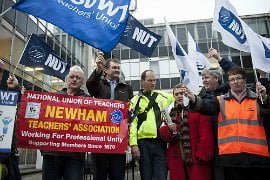The recent speech by shadow Education Minister, Stephen Twigg, should ring alarm bells for anyone expecting any significant change from the current state of affairs in the event of Labour winning the next election. John Pickard of the NUT argues that the Labour leaders must make a radical break with the Coalition’s education policies.
The July speech by shadow Education Minister, Stephen Twigg, should ring alarm bells for anyone expecting any significant change from the current state of affairs in the event of Labour winning the next election. The speech was as weak and insipid as would be expected from a prominent member of the right-wing Blairite ‘Progress’ group in the Party.
Twigg had to admit that it was New Labour which introduced the idea of academies; but what he didn’t say was that New Labour also opened the door for almost all of Gove’s other reactionary education polices, like performance-related pay and streamlined capabilities procedures, which have become a charter for favouritism and bullying by head teachers.
Unfortunately Twigg’s basic educational philosophy is exactly the same as the Tories and, reading between the lines of his woolly and (deliberately) vague speech, there are a number of key elements that stood out.
He said, for example, that “Labour strongly believes parents have an important role to play in calling for and setting up new local schools” and also that “local communities will have a greater say about education in their area”. But it is clear that this does not mean that democratically-accountable local education authorities are being revived. On the contrary, this is a coded message in support of Tory ‘free’ schools, where a dozen or two pushy middle class parents can to set up a new school irrespective of a local over-supply of school places.
What is just as bad is Twigg’s acceptance of those academies that are currently in existence, meaning that they will continue to be run by private education authorities – academy chains – rather than be re-absorbed into the local authority system. This is a particular blow, particularly when bearing in mind that half of secondary schools are already academies and the proportion is likely to be nearer 90% than 50% by 2015.
Already academy chains are opening the door to privatisation as the chains are being run by people who have links with private companies that make profits from supply staff, school facilities management and school equipment. The academies have been handed on a plate extremely valuable assets in the form of land and buildings, property that should belong to local communities and which in the future will provide an even greater source of profit for the private sector. Twigg said nothing about this sequestration of public property.
Neither did he say anything about school governance. Under the old system, school governing bodies may not have been perfect but at least they represented local communities – with elected parents, teachers and local authority representatives on them. Most academies now have boards that are self-electing cliques with little or no accountability to local communities.
Another “position paper” is now circulating in the Labour Party, supposedly written by former Labour minister, David Blunkett, but this is hardly any better than Twigg’s July speech. It points to the many failings of Tory policy and the “incoherence” of current education policy, but it doesn’t mention that this incoherence started under Labour – with grant-maintained schools, academies, Foundation schools, specialist schools, to name but a few – and with more top-down initiatives than schools could keep up with. Teachers in my school used to joke that our education system had more “pilots” than the Luftwaffe.
Like Stephen Twigg’s proposals, David Blunkett’s are based on accepting the entire Tory structure of academies being run by chains and free schools set up by local parents and “interests”, whoever they might be.
The Labour Party should ditch these Tory ideas being pushed by Twigg and Blunkett. The Labour leadership should be arguing for a policy based on a properly funded and fully comprehensive education system. Whatever structure a local authority uses – education authorities or children and young peoples’ directorates – it is important that the system is democratically and locally controlled. All those academies and ‘free’ schools opened or converted in the past years must be reassigned to the local authority so that resources, buildings, admissions and special service provision can be based on a coherent and efficient local policy.
One feature that stands out in both Stephen Twigg’s speech and David Blunkett’s position paper is that they have absolutely nothing to say about the teaching profession. As it is with the Tories, there is the unspoken assumption that teachers are somehow an obstacle to good education policy. Whereas at present unqualified teachers are able to be employed in academies and free schools, what is disgraceful is that neither of them are even prepared to demand that all teachers should be qualified graduates. Indeed, their acceptance of current schools arrangements in 2015 imply the opposite.
As part of its schools policy, Labour must seriously address the issue of the education workforce – demonised, worn down and demoralised by successive governments. Labour should give a clear commitment to the restoration of national pay bargaining and conditions of employment, a proper provision for professional development and a targeted reduction in the teacher-pupil ratio.
Under capitalism, we see that, on the one hand, our education system is increasingly being opened up to private, profit-making interests; and on the other hand, the crisis of the system and the ensuing austerity policies of the coalition government are forcing down the conditions of those who teach. It is only through the socialist transformation of society, with a rational plan of production that puts the wealth in society under democratic and public ownership, that we can have an education system that is adequately funded, run in the interest of ordinary people, and staffed by well trained teachers.






